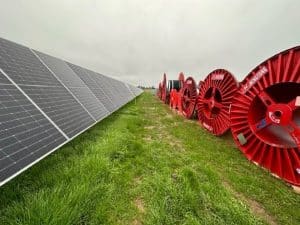Queensland is experiencing remarkable growth in solar energy adoption, with around 17% of all households now equipped with solar panels, totalling over 1.2 million installations. This surge reflects a growing commitment to renewable energy, driven by increasing electricity prices and the need for sustainable solutions.
Many Queenslanders are now integrating battery storage into their systems. This allows them to maximise their solar power usage, storing energy generated during the day for use at night or during periods of low sunlight.
As the market for solar panels and energy solutions expands, Energy Matters provides free quotes for solar system installation in Queensland. Homeowners can easily connect with trusted solar panel installers in the region, ensuring they find the best fit for their energy needs and budgets.
Investing in solar panels in QLD not only enhances energy independence but also contributes to a cleaner environment. For those looking to explore solar power solutions further, now is an ideal time to consider the benefits of solar panel installation in Queensland.
If you’re interested in learning more about solar system options or finding reputable solar panel installers in QLD, don’t hesitate to request free quotes today.
Get Solar Quotes from up to 3 Local Installers in QLD
Step 1: Fill out our straightforward quote form to get connected with trustworthy solar installers in Queensland.
Step 2: You will hear from up to three local installers via phone or email, providing you with detailed information and their best deals.
Step 3: Review quotes at no cost and with no obligations—choose the option that best aligns with your needs and budget.

Read more about solar panels and other renewable energy technology in your area:
On this page
Do Solar Panels Make Financial Sense? Learn About Your Possible Savings
Solar panels are a smart investment for Queensland residents in 2024. Homeowners can save an average of $1,000 to $1,700 annually on their energy bills by transitioning from traditional power sources to solar, depending on the system size and household consumption. The Queensland government also offers rebates and initiatives to encourage solar adoption, such as the Cost of Living Rebate and Small-scale Technology Certificates (STCs), which further reduce the upfront cost of solar systems.
With solar technology becoming more affordable and accessible, many Queensland residents are taking advantage of these incentives to reduce their energy expenses. Whether you’re in Brisbane or regional areas, there are plenty of excellent solar deals available. To find the best options for your home, get free solar quotes today at Energy Matters.
How much do solar panels cost in QLD?
The cost of installing solar panels in QLD varies depending on system size, installation complexity, and brand choice. As of October 2024, homeowners in QLD can expect to pay around $4,380 for a 4kW system, $4,760 for a 5kW system, $5,140 for a 6kW system, $6,240 for a 7kW system, and $8,400 for a 10kW system. These prices include standard installation, the STC discount, and GST. Larger systems generally provide greater long-term savings, especially for households with higher energy consumption.
The chart below outlines the typical costs for various solar system sizes in the QLD, giving a clear understanding of current market rates.
Figures are accurate as of October 2024. Source: Solar Choice – October 2024 solar price index. Your solar system price will vary according to your location, installer, products, and any deals or discounts provided by your retailer. All prices are to be used as a guide.
“To make use of my sixteen solar panels, which I’ve had for five years, I had a solar battery installed. The company Energy Matters recommended expertly planned it, and everything proceeded without a hitch. The battery operates flawlessly and informs me of how much energy I am using, how much it has stored, and how much energy I have sent to the grid. It has adequate energy reserves to generally survive the day, even on cloudy winter days.”
Miller
“Thanks for the assistance. From the point of getting a quote until installation, the procedure is fairly swift. The members that arrived to install the solar panels did an excellent job as well. They arrived on schedule, and the installation was flawless.”
Theo
“The 10.5k solar system was installed in February 2021, and the batteries were added in April 2022. EM’s service excellent throughout and the company they sent to us. Timely installation and thorough, affordable quotations. Monitoring tools are simple to use and offer a good return on investment.”
Molly
QLD solar panels: An investment with great returns
For a 6.6 kW solar system in Queensland, homeowners can expect to save between $900 and $1,400 annually, depending on their electricity usage and whether they include battery storage. This estimate is based on the current feed-in tariff (FiT), which varies from 6 to 14 cents per kilowatt-hour (kWh).
For larger systems, such as a 10 kW solar setup, annual savings can reach up to $2,500, especially for households with higher self-consumption rates or those on time-of-use tariffs. These savings demonstrate the financial benefits of investing in solar energy for homes across Queensland.
By taking advantage of government incentives and the decreasing costs of solar technology, Queensland residents can secure a smart investment in their energy future.
QLD rebates and incentives
QLD residents and businesses can benefit from several state and federal incentives and rebates, including:
- Small-scale Technology Certificates (for residential and small to medium businesses)
- Feed-in Tariffs
- Cost of Living Rebate
Discover more about these programs and initiatives through the button below.
Energy efficient products and upgrades
Upgrade your outdated appliances to the latest energy-efficient technology to significantly reduce your energy costs. Older systems, such as hot water heaters, heating and cooling units, and other household devices, may be costing you thousands each year. Replacing them can reduce your environmental impact and improve your home’s efficiency.
In Queensland, installing a solar hot water system can save households between $250 and $700 annually on energy bills, depending on hot water usage and the type of system. These systems use solar energy to heat water, reducing reliance on traditional electricity or gas sources, and making them both cost-effective and eco-friendly.
Queensland residents can access various incentives, including support programs aimed at helping households upgrade to energy-efficient products, especially those facing financial hardship.
QLD solar batteries: The future of renewable energy
In Queensland, 30% of all new solar systems installed in 2024 included battery storage. Adding a battery to your solar setup allows you to enjoy energy savings day and night. Solar panels combined with batteries not only enhance your home’s value but also significantly cut energy bills and boost your independence from the grid.
Batteries are seen as the future of energy, enabling you to store solar power generated during the day for use at night or on overcast days when sunlight is limited. By incorporating a battery with your residential solar system, you can potentially double your self-consumption of the electricity you generate.
To maximise the benefits of your battery, consider joining a Virtual Power Plant (VPP). A VPP can shorten your battery investment’s payback period and provide extra income by allowing you to sell stored energy back to the grid during peak demand. To find out more about the Origin Loop VPP, visit our page.
Australia's EV movement is accelerating. Are you ready for the switch?
Did you know that about 45% of Queenslanders are considering purchasing an electric vehicle (EV) within the next five years? Installing a home battery lets you charge your EV overnight and sell excess stored electricity back to the grid. This gives you the flexibility to choose what suits your lifestyle and take advantage of the current feed-in tariff.
With residential EV charging, your home becomes a personal charging station, reducing your vehicle costs and adding convenience. The growing EV market in Queensland, where EVs accounted for approximately 8% of all vehicle sales in 2022, highlights a shift toward sustainable transport options.
Now is the perfect time to explore how solar and battery solutions can increase your energy independence while supporting the move to electric vehicles.
Making solar simple
We know that worries about potential challenges can make some hesitant to explore solar energy. At Energy Matters, our partners are experts in creating tailored solutions that fit your specific requirements, offering guidance every step of the way. Whether you’re in Queensland or another region, you can easily request up to three quotes from trusted local installers. They’ll collaborate with you to understand your needs and answer any questions you have about switching to solar.
Take the first step toward a greener future and explore your solar options today!
QLD solar and battery FAQs
No, the Battery Booster rebate program ended in May 2024. However, you may still explore other state or federal incentives for solar and battery installation.
While the Battery Booster has ended, you can still benefit from federal programs like the Small-scale Renewable Energy Scheme (SRES), which provides financial incentives for solar panel installations.
While specific rebates have ended, solar and battery systems still offer savings by reducing electricity bills and providing energy independence, especially during peak periods or outages.
The federal SRES program may offer some support through small-scale technology certificates (STCs). Additionally, some local councils and energy providers might offer financing or incentives.
Batteries allow you to store excess solar energy and use it during peak times or outages, which can significantly reduce your reliance on the grid and save money over time.
Yes, it’s important to install an approved and high-quality battery system that fits your energy needs. Although there’s no longer a specific rebate, choosing an efficient system ensures better long-term savings.
Depending on the size and brand, solar battery systems typically range from $5,000 to $15,000. Costs vary based on capacity, installation complexity, and location.
Contacting a licensed and experienced solar battery installer is the most important step to ensure that you get a battery to suit your current and future needs. Energy Matters provides a free service to connect you with local and trusted installers. Get free quotes today.
QLD news and updates
Keep up to date with the latest renewable news and updates from Queensland.










































